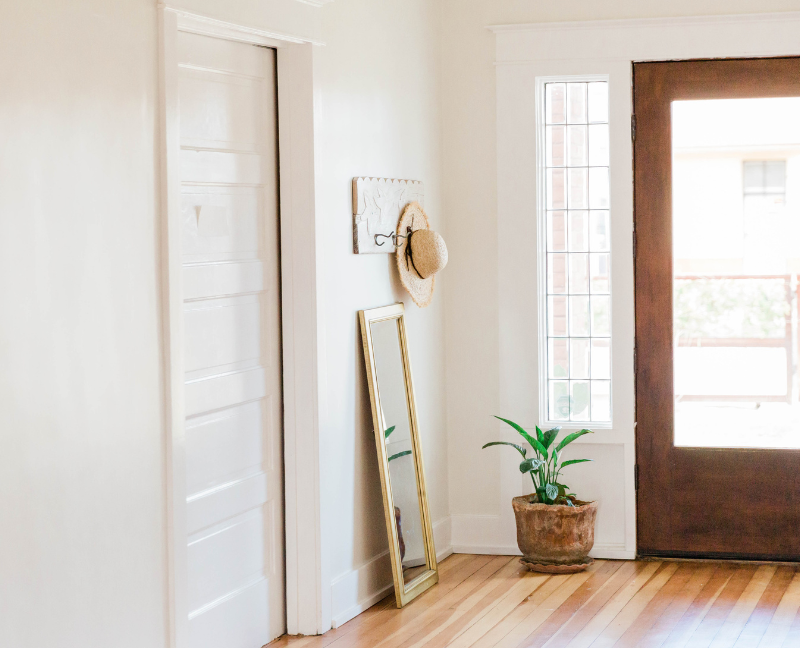If you are thinking of getting a new property, co-buying or joint purchasing a home with your partner, family or friends is an option that can offer a quicker path to home ownership. It is also a common way that people enter the property market, especially if they're buying to occupy. With property prices still increasing and the urgency and pressure to own ever-present, property co-ownership is a sensible option for anyone wanting to buy their first home or enter the market as an investor more quickly.
But first, you have to learn how to co-purchase a property wisely and safely.
To ensure that co-buying or co-ownership is right for you, you need to take into account risk vs reward. When you are in a co-ownership, you can pool your money with friends or family to buy your first home, sooner. You also don't need to save a lot for a full deposit as you can combine your borrowing power to borrow the rest from a loan provider since you will both pay for it later on. It will also give you more options to choose from and will reduce a lot of costs like living expenses and bills.
You can own a property in a variety of ways, such as personally, corporately, or even as a trust asset. Each structure has advantages and disadvantages; therefore it is essential to consult with a legal, tax, or financial consultant to determine which one will be most advantageous for you, especially when considering tax advantages.
Considering the basics of a home is also a must! Like the location, neighborhood, and establishments, such as restaurants or malls (if you are outgoing).
You may also want to dive into the house details, like how many bedrooms or yard sizes you want. Above all, think about what kind of home will be best for living communally. That being said, you may want to look for a place where you can design wonderful communal areas that promote socializing and at the same time, a place where you have plenty of private spaces to retreat to when necessary.
Once you've decided to co-own a house, you need to discuss or settle an agreement on the rights and legal obligations of each joint owner of a property. You may want to discuss these matters with your lawyer before deciding to buy. Depending on your agreement most cases will cover who will reside at the house, and who will be responsible for the payments, like mortgages and property maintenance. In case of unfortunate events like death and bankruptcy, you need to put a plan for what happens with the property.
You may also decide to split the ownership share 50-50 or according to the percentage of your contribution. Your purchase agreement and certificate of ownership will both indicate that you are "tenants in common" in this situation. Each individual owns their own unique share, which they are free to sell, lease, or deal with in any other way they see suitable.
If your co-owner is your partner you may want to opt to purchase the property as "joint tenants". This means you both effectively own the whole property. If again, an unfortunate event happens, if your significant other dies, the other half would assume the whole title to the property.

Property co-ownership is a good option but it’s not for everyone. So before anything else, it’s important to know the legalities and the risks involved before entering a co-ownership or joint ownership with someone.
Getting legal advice is always a good idea to determine whether you need a written agreement or not. This will help you know and reflect on all the details of split or joint ownership and any terms and conditions around the break of that agreement.
Talking to a realtor is also a key guide in home buying. They are also one of the best experts to reach out when you need help deciding what kind of home will work best for co-ownership. The experience of being in a home can help you extend your intuitive sense of what home means and refine your list of must-haves, deal-breakers, and compromises.
Another factor that lenders assess when determining whether to provide a mortgage to someone is the amount of debt that person is responsible for, and they will likely assume that each of you is possibly responsible for your entire mortgage payment. It could also be harder to make another purchase while you're still on the co-buy loan. You also can't buy and sell shares of a loan to others.
If you are also planning on buying the house using "cold hard cash" (which by the way will make it easier for everyone to enter or exit the arrangement), you can talk to your financial planner regarding the cash purchases and how to split the money and other arrangements.
When co-buying and living under the same roof, you have to set the rules. This means setting the quiet hours, whether pets will be allowed, rental policy, and other crucial things you want to add up.
Having regular house meetings is also a good idea. It's pleasant to get together for regular check-ins and work parties, and it makes it simpler to handle issues or make changes to how you live together before misunderstanding occurs and erupts into raging volcanoes. Make an effort to maintain the relationship. It's easy to take each other for granted when you live together, but not too much. It's all about the work while enjoying it.
To sum up, purchasing a house with others may sound exciting; however, it can also be challenging.
To prevent any future difficulties or disputes, it's crucial to have independent financial, tax, and legal advice. That way, you will also know and protect your rights and peacefully enjoy the property co-ownership for many more years.
Nonetheless, you've got this! It may feel new, it may feel more complicated, but it can be done with the proper guide. And as always, if you need help on this matter, our team at RE/MAX Advanced Realty - Indy Home Pros is here to help!
Moving across the street or the country is already stressful, especially during this hot season of home buying and selling. Other than the daunting process, another challenge is the short supply of moving trucks due to the demand.
But, don't worry! We're here to make your moving day smooth and efficient by sharing a few tips on how to pack boxes for moving without breaking a sweat.
Go for a mid-week, mid-month move-in date. As the weekend draws near, the cost of movers and rental vehicles will rise. During regular business hours, dollies and elevators will be available for your use. Additionally, you'll have the entire weekend to settle down and unpack!
Contrast opportunity cost with moving firms while choosing one. As a general guideline, request estimates from three or more different businesses. Then, you'll be confident enough to select whichever, in terms of cost and service scope, best suits your demands.
Before you start packing those boxes, make sure you’ve decided on what not to pack. Focusing on things you want to declutter will help you know what to pack later on. Get rid of anything you don’t love, need or want. Bringing items you don’t need or want in the new home is a waste of time.
Moving in is already exhausting so avoid lugging anything you're just going to toss out later. Clean up everything from drawers, closets, and storage units before packing even begins.
To properly declutter unnecessary belongings, start by preparing four separate piles: a trash pile, a donation pile, a sell pile, and a storage pile.
Anything that’s not worth donating can go directly into the trash. Remember to throw away trash responsibly. Items that are used once or just a couple of times but are not worth keeping or selling can go to the donation pile. You can give your donations to charitable sites. It’s a win-win for you! You can help others at the same time let go of the items you won’t be needing.
Anything that is of value and worth can go straight to the sell pile. Easy-to-use apps for pre-owned belongings can help with that. Lastly, for items that you won’t be needing anytime soon but are not yet ready to toss, put them in a storage pile.

After deciding what to toss out and toss in with those boxes it’s time to organize them. Using box labels, sharpie markers, and color-coded stickers or tape will make it easier for you to keep track of what’s inside each box, especially if you don’t want to lose items during the move.
Organizing your boxes will also help movers (and yourself) know where to put everything once inside the new home. You also want to avoid filling one box with heavy things such as dozens of books. Remember, large boxes should contain lighter items, such as blankets and pillows, and small boxes should contain heavier items, such as pots and books.
Once you’ve organized your things, it's time now to pack! Are you ready to begin?
To make packing more efficient, focus on the room one at a time. Begin with rooms you won’t need in the coming days or weeks leading up to the move. For example, packing up your closets, libraries, and living room could take at least a month or two before your move date. While rooms to pack last might include bedrooms, bathrooms, child’s playroom, nursery, and kitchen. Labeling each box according to the corresponding rooms will also make it easier for you to find as it is organized.
You don’t want to break those precious vases when moving so to ensure all your valuables are safe, have plenty of packing peanuts, lots of newsprint, box inserts, bubble wrap, and tape on hand. If you are also thinking of packing your plants (yes, you can transport them) with some smart thinking and careful planning, plants can be safely transported to your new home to continue to thrive there.
Here are some recommendations that will help you along the way with your plants. Hydrate your plants before uprooting them. Give your plants a trim. Uprooting your plants with care by watering them before digging up and keeping as much soil attached to the roots. Re-plant as quickly as possible. You may also take a photo of your items before moving just in case it gets damaged. After packing up each box, make sure the tops, bottoms, and sides are all taped and secured properly.
The label holds the key to easy unpacking. Clearly label the top and at least two sides ( enough for you and movers to read). Wrap the marker in packing tape or clear tape to prevent tearing and scratching.
If you are thinking of packing hazardous items consider transporting them separately. Disposing them will make it a lot easier for you. Items like paints, varnishes, cleaning chemicals, and more can be packed together in plastic bins before putting them in the box to avoid spilling. Medical items and medications should also be kept separately and if decided to dispose of, they should be disposed of properly for others' safety.
Pack a few essential belongings and keep them with you during the move and be sure to make it organized as possible. Keep your valuables, such as expensive jewelry, watches, bags, and sentimental items on you during the move. We don’t recommend transporting these on a moving truck, this is also for your peace of mind as you won’t need to worry about your valuable items getting lost or stolen if you can help it.
Need more tips on how to move in seamlessly? If yes, feel free to visit our website to learn more.
Buying a home can seem like a daunting process. When you think about it, it may just be one of the most expensive and difficult you will ever purchase. You need to be emotionally and financially prepared. Despite that, proper preparation, research, and determination can help you get that home you’ve been wanting and waiting for — from dreams of owning to the paths toward handing over the keys to your new home.
Before dipping your toe into the buying pool, it’s important to consider whether you are now ready to take the responsibility of owning a house. The first thing is to take a closer look at your budget.
To determine how much you can spend on a home, you may start by listing down all your expenses and reviewing your bank statements. That way you can figure out how much you are spending daily, from transportation, food, and streaming services to your leisure spending and take-outs. Taking a good hard look at your finances will help you decide if now is the right time to purchase a home.
It is crucial to know if it's the right time. Just because you can get a mortgage or financial assistance doesn’t always make it the right time to do so. Keep in mind that besides the mortgage, purchasing a property involves extra one-time payments that can mount up rapidly, such as closing charges, legal fees, and other connected costs like a house inspection. Moreover, don't overlook the cost of relocation or house upgrades. Plus, you’ll want to plan for those expenses like a moving truck or new furniture. The last thing you want to do is stretch yourself too thin financially.
Wondering what's next if you’ve already made up your mind to buy a home? The first step to getting the ball rolling is to find an experienced local real estate agent to guide you through the process.
Typically, the seller will cover the commission fees for both their agent and your buyer's agent, so hiring an agent won't typically cost you anything. The agent will not only help you find your dream home (which can be very tough in a seller’s market) they’ll also help you through negotiations and paperwork. When purchasing a new home it is nice to have some experts to advocate for you when discussing pricing or needed repairs with the seller or their agent.
Understanding your local real estate market is crucial. The housing inventory in your town and how you formulate your offer can both be significantly impacted by whether it is a buyer's or seller's market. To prevent missing out on or overpaying for your desired house, rely on your real estate agent's knowledge in this area.
Now that you have an idea of the current trend and the amount of your dream house, it’s time to get a pre-approval letter. A pre-approval letter is a written estimate from a lender of how much you will likely be able to borrow from them.
The letter will help you determine how much you can afford. It will also help demonstrate a secure home loan when you are ready to make an offer on a house. During a pre-approval process, a lender will do a hard look at your credit pull, take a look at your bank accounts, and review everything including your tax returns and pay stubs. They will also confirm your employment history and dive into your assets and debts.
Pre-approval means a near-certain approval for a loan up to the amount specified by the lender, assuming nothing changes. Pre-approval letters, however, typically only hold true for 60 to 90 days due to the cyclical nature of credit scores, employment, and financial stability.
Take your time in submitting all the requirements before getting pre-approved, be sure you're serious about buying because getting pre-approved more than once quickly could harm your credit.
Now that you’ve got the nitty-gritty out of the way, it’s time for the fun part—house hunting! Choosing a neighborhood can be overwhelming but you can narrow your choices by focusing on where you can afford a home.
You can also consider the location of the house to where you are working and if you have a family, think about the schools available in the area for your child.
You can also check the shops, groceries, and restaurants nearby for your convenience. Talking to friends and family and knowing where they live will help you check out your options. Learn more about your potential location by having a quick walk or a tour of the neighborhood to help you decide.
Once you have a preferred location, the next step is to check for homes. Consider major components of the home and lay out your preferences for each — including minimum square footage, rooms like bedrooms, bathrooms, dining area, visitors area, garage spaces, finished basement, or specific neighborhood. Make sure your agent knows all the personal preferences you want. That way, you will both make the most of your time.

Once you found the one -- a.k.a. your dream home -- it’s time to make an offer.
The amount you're ready to pay, as well as information like who covers which closing expenses, whether the offer is subject to conditions (such as having to sell your own house first), and the projected closing date, will all be included in an offer. This offer is a crucial beginning point for discussions with the seller even though it might be modified along the route.
Working with your agent closely can help you make sure your offer fits your specific situation and is competitive. In a highly competitive market, where attractive listings are scarce, sellers will be likely to receive multiple offers, so you want yours to be the most attractive while still not overpaying for the property. You’ll also want to move swiftly to avoid losing out to another buyer if you’re not on the seller’s market.
Hiring a home inspector is always a good idea, so schedule a home inspection as soon as possible. They can help you learn about any issues that may prevent you from buying. A licensed home inspector knows what to look for -- they will cover the condition of the home, especially when it comes to foundations of a roof, plumbing, HVAC systems, and other defects. It will give you the chance to reconsider or have room for renegotiate if structural damage or needed repairs are discovered.
It's time to hand over the keys after the home inspection and any repairs that you and the seller have agreed upon.
This is accomplished during the closing, which operates somewhat differently depending on your state. Regardless, the transaction is completed on both sides at closure.
Before the closing date the seller, the buyer, and their representatives will sign the papers officially sealing the deal. You’ll also be given a settlement statement that lists out exactly how much you’ll be paying that day.
It will show your final purchase price and all the included fees like insurance and tax payments. These are kept in an escrow account with your mortgage lender so they may pay the bills when they are due on your behalf.
The final purchase price will be deducted from any outstanding mortgage balance and any seller-paid closing charges, such as past-due real estate taxes, agent commissions, and title company fees.
Once the closing is settled, congratulations — finally the place is yours. You’re now the proud new owner of your dream home! Enjoy and start to picture your new life inside the walls of your new home.
Disclaimer: We know this is easier said than done; however, there's no need to worry. Our team at RE/MAX Advanced Realty - Indy Home Pros is here to help!
Our agents have 8 years of average experience in selling and buying just listed homes for sale, so rest assured that we have the expertise and skills needed to help your relocation quickly and seamlessly.
Contact us at 317-298-0961 to learn more!
In the first part, we learned some facts about Indiana, the average salary of those who live there, the status of the job market, its population, the cost of living, weather, and climate, and many more.
Now, we'll dive deeper into the Hoosier State and discover more things about this beautiful place.
The rate of violent crime in Indiana is slightly higher than the national average. According to recent data, there were approximately 400 violent crimes and approximately 2,600 property offenses per 100,000 persons. Indiana's violent crime rate is thus around 9% higher than the national average. Property crime was close to the national average.
On the other hand, the place offers some fantastic cities and villages. The Northwest Indiana region is home to nine of Indiana's top twenty safest cities. St. John was ranked first, Crown Point was ranked fourth, and Valparaiso was ranked fifteenth.
Because five distinct interstates intersect in Indianapolis, IN, Indiana is known as the "Crossroads of America." Indiana is the entryway from the east coast to the west coast. The rail system in the United States is vital to the highways that transport products. Indiana is home to several major freight rail lines. Indiana is home to rail intermodal, the Ohio River canal, and the Port of Indiana on Lake Michigan.
You will need a place to reside whether you are relocating to Indiana or visiting for another purpose. Indiana real estate, homes, and houses will continue to be in high demand in 2020. In 2019, the number of homes for sale in Indiana climbed by 3% to slightly more than 4%. Several factors are contributing to Indiana real estate's high demand and value growth.
Real estate values in Indiana rise as a result of both business and inhabitants. Indiana is a low-regulation, business-friendly state. The minimum wage is cheap, schools are excellent, and public services are extensive. Furthermore, tax rates in neighboring Illinois are encouraging more firms and residents to relocate to Indiana. Finally, Indiana has shown to be a secure, thriving state that is also a fantastic location to live.
Northwest Indiana real estate had some of the most significant improvements in 2019. Last year, the number of homes for sale in Northwest Indiana climbed by 5.6%. We anticipate that this tendency will continue. The most significant contributing elements are the increased number of residents from Illinois and the recent economic expansion in Northwest Indiana.

One advantage of residing in Indiana is the state's dedication to environmental preservation. Indiana is home to some spectacular natural places.
The state's northern boundary is with Lake Michigan. You can visit the Indiana Dunes State Park and the Indiana Dunes National Park while you're here. You may relax on the beach, climb the sand dunes, or go for a trek through the woodlands along the lakefront.
Hoosier National Forest is located in the state's south. The United States manages this forest preserve. The Forest Service. The Hoosier National Forest encompasses about 200,000 acres of property in southern Indiana's Appalachian foothills.
Indiana's culture is diverse. There are several densely populated places in Indiana. Among these are Ft. Wayne, South Bend, Indianapolis, and the Northwest Indiana region all within commuting distance of Chicago, the third-largest city in the United States. These regions have the commerce, entertainment, and cuisine that you would expect to find in a bustling metropolis.
There are several smaller cities in between, separated by extensive farmland. This provides tremendous balance for Indiana people. Those who reside in the city might live a more urban lifestyle. People who live in the country might enjoy a calmer, more communal existence.
Indiana has a little bit of everything, so there is something for everyone. When you need a change of scenery, get in your car and drive down the highway (Indiana is known as America's Crossroads) to meet a new portion of this great state.
Here are some things to consider before relocating to Indiana.
Whether you're planning to move to Indiana or want to learn more about real estate in this area, our team at RE/MAX Advanced Realty - Indy Home Pros is more than willing to help.
With 8 years of average experience as a real estate agent, we ensure to make your relocation plan seamless and hassle-free.
Contact us by clicking this link!
As recession fears grow, you may be wondering how a recession affects house values. A recession can have an impact on property prices, but you should not expect home prices to decline. Any change in housing prices during a recession will be influenced by unique circumstances. These are the supply of available homes for sale, as well as the health and size of the active homebuyer audience.
Every day, we assist clients in determining the value of their real estate in Indiana. If you're not from Indiana but want to know what happens to housing values during a recession, keep reading.
A recession is a major reduction in economic activity that lasts for a lengthy period of time.. Recessions usually affect the majority of the economy, including the property market. A recession can have a variety of effects on the property market.
The most likely result is decreased overall activity. Fewer transactions will come from fewer sellers wanting to sell and fewer buyers willing to acquire. During a recession, observers and experts in the housing market should expect fewer home sales and purchases.
Second, the market's buyer and seller behavior will shift. More expensive house sellers may become more willing to negotiate with homebuyers. Homebuyers may benefit from this. Homebuyers, on the other hand, are likely to become more protective about property pricing and more demanding of concessions.
Finally, during a recession, housing prices can become more volatile. However, a significant price reduction is not guaranteed. Home prices are affected by housing demand, employment rates, interest rates, and inflation.
During a recession, housing prices might rise, fall, or remain flat. Both supply and demand are required in the housing market.
To better grasp what to expect or to make more accurate predictions regarding the housing market during a recession, you must first understand the elements that drive housing supply and homebuyer decision-making.
The following factors have the most sway over the US housing market. Understanding this will help you better predict what will happen to housing values during a recession.
Unemployment Rates
During a recession, the unemployment rate will affect real estate prices. If unemployment remains low, many people will remain confident in their ability to earn a living. This will boost homebuyer confidence and encourage greater property prices. However, if the unemployment rate rises, many purchasers will become hesitant and wait for a certain moment to buy a property. In this case, housing prices will plummet.

Interest Rates On Mortgage
Mortgage interest rates have a significant impact on home values. If mortgage interest rates are high and rising, there is a considerable likelihood that housing values will fall during a recession.
For starters, a higher mortgage interest rate increases the cost of borrowing money to purchase a property. As a result, to get the same repayment price, the buyer must offer less for the residence. Buyers can also offer the same amount but will have a higher mortgage payment due to the increased mortgage interest rate.
Second, rising mortgage interest rates reduce home prices by harming present homeowners. A family that owns a home but needs a larger home is unlikely to go from, say, a 3% mortgage rate to a 6% mortgage rate. Instead, that family will try to wait for the mortgage rate to fall. This restricts supply because that family is not selling, but it also removes activity from the market.
Finally, many first-time buyers will become dissatisfied with the process of purchasing a property. They saw the earlier lower rate as a squandered opportunity. Many people would prefer to wait for the cheap rate to return in the future. Again, during a recession, this activity will reduce total activity and may result in reduced property prices.
Wage Growth Vs. Inflation Rate
Inflation and salary growth go hand in hand. Consumers will feel the pinch as costs for basic goods and services rise. Homebuyers will be unwilling or hesitant to pay high costs for a property if prices rise faster than wages. If salaries do not keep up with inflation, house prices will fall during a recession.
Quantity Of People Within Specific Age Brackets
The size of the active homebuyer audience is important. The more people who are ready to buy a property at the entry level, the more activity and housing demand there will be in the housing market. This will cause housing values to rise. However, if there are few prospective buyers at the entry level, property prices will fall owing to a lack of housing demand.
The most significant factor to consider is the number of people aged 25 to 35 at the bottom. The United States currently has over 44,000,000 people in this age bracket, which is the highest number in history. This is one of the key reasons why the property market has performed so strongly since 2019. This big entry-level base will also help to stabilize housing values amid a 2020s recession.
Supply Quantity And Quality
What happens to house prices during a recession is heavily influenced by housing supply. However, supply comes in two parts.
The first component of supply is quantity. This aspect of supply is often mentioned. If supply is limited and demand is high, property prices will rise. If there is more supply than demand, housing prices are projected to fall. During an economic slump, the other component of supply that is less discussed becomes highly significant.
The other side of supply that is rarely discussed is the supply's quality. Specifically, the supply's aspirational desire. Homes must entice prospective buyers. For years, the same sorts of homes and home styling have been built in numerous sections of the country.
As a result, folks who can afford the latest and greatest in new homes may be hesitant to purchase. This is because the newest stock is uninteresting. This will create a bottleneck by keeping the middle tier of the market in their current homes owing to a lack of desire to relocate.
We hope that this post has enlightened you. If you have any questions or want to learn more about real estate, please call us at 317-298-0961 today!
It is simply a matter of being familiar with Indiana to determine whether or not it is a good decision to relocate there. This guide will help you get familiar with the state and determine whether Indiana is an appropriate area for you to reside.
Before you move to Indiana, you probably want to know how much money people in Indiana make. According to the latest recent data, the average wage in Indiana is over $47,000, and the average household income is around $55,000. Personal per capita income in Northwest Indiana is somewhat less than $46,000. The average salary in Indiana's capital, Indianapolis, is over $52,000, 10% higher than the state average. Learn more about the typical Indiana income across the state.
The state's job market provides an answer to the issue of why relocate to Indiana. Indiana is home to small, medium, and large firms. Indiana's key sectors include agriculture, energy, manufacturing, steel production, healthcare, and professional services. Manufacturing employs around 17% of all nonfarm employment. Major corporations are concentrated in medium and bigger cities. One of the advantages of relocating to Indiana is that the state has a lower unemployment rate than the national average.
Certain industries in Indiana are heavily concentrated in tiny geographic areas, which is a distinctive feature of the state's economy. Northwest Indiana, for example, is home to some of the major steel mills in the United States. More than half of the blast furnace capacity in the United States is located in Lake and Porter Counties.

Another example is that 80% of recreational vehicles (RVs) manufactured in the United States are constructed in Northeastern Indiana, in places like Goshen. Elkhart County is known as the "RV Capital of the World," whereas Warsaw, Indiana is known as the "Orthopedic Capital of the World" due to the presence of three large orthopedic medical equipment firms.
Here are some more details on the Indiana job market:
The population of Indiana is increasing. Indiana now has a population of approximately 6.79 million people. This is a 300,000 increase over 2010. More information about Indiana's current population can be found here. In addition, the Indiana University Kelly School of Business publication INContext offers an excellent chapter on Indiana's predicted population growth until 2050.
Many surveys have placed Indiana as one of the most affordable states to live in. Yes, our wages may be slightly lower than those in other states. We make up for it, however, with a low state-income tax rate, constitutionally protected property tax caps, near access to important resources, and a competitive business environment that welcomes new companies.
According to U.S. News & World Reports, Indiana is the third cheapest state. If you search the internet for this question, you will most likely discover multiple studies ranking Indiana as one of the top ten most affordable states.
The four seasons have been experienced in every section of the state. Winter, on the other hand, is a wildcard. Temperatures in the spring and fall are mild, with highs in the 50s and 60s and lows in the 40s. Summer brings days in the 70s, 90s, and even over 100 degrees. Winter is a wild card.
Indiana is a large state that stretches for 250 miles from north to south. The southern portion experiences snow and cold in the winter, as does the center section, albeit slightly more and slightly colder. Northern Indiana, on the other hand, has all the hallmarks of a hard midwestern winter.
Lows in the teens and single digits are common in Northern Indiana throughout the winter. Temperatures below zero are not uncommon. Northern Indiana has the most snow, and there is a phenomenon known as lake effect snow in a few select areas.
In essence, snow bands form off of a huge body of water, like Lake Michigan, and, if conditions are ideal, these bands will dump snow on a region. I have always resided in northern Indiana, which is one of the select locations where this occurs occasionally each year. Sincerely, there was a time when my neighborhood had a 20-inch snowfall in a single day. They had five inches at two miles. They had none five kilometers distant.
The educational system of Indiana is strong. In Indiana, approximately 87% of students complete high school. Of those, over 63% enroll in colleges right away. You may get more information on Indiana's schools here. The Indiana Department of Education works hard to make information about the state's public schools readily available.
Indiana's colleges and universities are among the best in the country. In the past, Purdue University excelled in the sciences and math, producing generations of graduates. Indiana University, Notre Dame, Ball State, Butler, and Valparaiso University are a few of the state's other prestigious universities.
These are just some of the basic things about Indiana. In our next post, we'll learn more about this beautiful Hoosier State.
Curious about escrow – how it works, its benefits, the fees that come after, and more? If yes, this article might help whether you’re an Indiana real estate agent or a home buyer / seller.
A homeowner's insurance and property tax escrow account functions similarly to a savings account.
Escrow accounts are typically used by homeowners who have mortgages on their homes. You, the homeowner or borrower, deposit money into an escrow account kept by your lender each month. Your homeowner's insurance and property taxes are paid with the funds in the account. Your lender will make the necessary payments to your homeowners insurance provider and the local taxing authority on your behalf.
Your lender will be given instructions on how to determine the monthly payment you must make to your escrow account.
Your lender received the homeowner insurance quote from the business you wanted to employ when you bought your house. The lender's personnel researched the taxes and noted the rate. To correspond with the twelve months of the year, they then divide this number by 12. Your payment for principal and interest is increased by this sum. Indeed, lenders have the option to charge more.
Your lender is permitted to impose an overage or a buffer fee. To prepare for rises in the price of insurance or taxes is the reason this would occur. This was acknowledged by the Real Estate Settlement Procedures Act (RESPA), but it also imposed restrictions on your lender. Only a sum that is one-sixth more than the actual insurance and tax obligations for any given year may be retained by your lender. This cushion occasionally becomes excessively large. If so, your lender will offer you a refund to give you the money that was improperly held in escrow.
Many property purchasers want to have an escrow account. You benefit from the escrow account because it is a terrific instrument for creating a budget for future costs.
The local government may seize your property if you don't pay your property taxes. Additionally, insurance shields your house from disasters. Each year, a fee must be paid for each of these. The escrow account allows you to make regular payments for these costs throughout the year rather than receiving a sizable charge every year that you might or might not be ready for. It is a great method to stay up to date on the costs involved in house ownership.

Cash to close is a term that your real estate agent may use to describe the sum of the down payment, prepaid interest, title costs, loan origination fees, and impounds.
Homeowners insurance and property taxes are impounded items, also referred to as escrow items. Most frequently, at the closing table, you will buy your full first year's worth of homeowner insurance. The title firm will also collect additional premium payments for an additional two to four months. In terms of taxes, the title company will gather two to five months' worth of property taxes, depending on when the taxes are due again. The lender will receive these overages and deposit them in your escrow account.
You'll receive a monthly mortgage statement. A line item for escrow items, such as the property taxes and insurance, will probably be visible if you look. This comes in addition to your other expenses, such as principal and interest payments.
Your house payment can increase if your taxes or insurance go up. Instead, if these decrease, your mortgage payment would as well. Once more, your lender must abide by RESPA and is only permitted to collect an excess of no more than one-sixth of the actual amount payable for taxes and homeowners insurance for the year.
Escrow accounts are utilized to regularly cover homeowner insurance premiums and property tax obligations for your home. Escrow accounts are beneficial. It is a terrific way to stay on track with your spending plan and prevent worrying about receiving a huge bill in the mail. Additionally, because your lender handles the payment distribution, you won't fall behind on your property taxes or risk having your homeowners insurance lapse as a result of missing payments.
If you're planning to sell or buy real estate in Indiana or want to learn more about escrow, our team at RE/MAX Advanced Realty - Indy Home Pros is here to help. Call us at 317-298-0961 to get started.
One of the biggest financial decisions you'll ever have to make is buying a house. It's more than just looking at what looks good for you and your family; it's about considering each stage of the process and the many factors that come along with it.
But that doesn't mean that it's always complicated. There can be a way to simplify the process and make smart and efficient decisions.
In this post, we'll help you by sharing more about the process so buying real estate in Indiana can be easier and smoother.
Establish A Budget
When you visit the ideal home, it can be depressing to learn that it is out of your price range.
Determine how much you can afford to spend to save time and disappointment. The general recommendation is to spend no more than 2.5 times your annual pay. You can use online budget estimators to find an appropriate house budget range that works for you.
Be sure to review other expenses on your bank statements, such as cable bills, gas, entertainment, food, and the like, to see where you may cut back on spending.
Get A Mortgage Pre-Approval
Being pre-approved for a mortgage rather than just being pre-qualified is the best approach to gaining an advantage in the competitive sellers' market. Pre-qualification would entail that lenders assess a homebuyer's affordability based on the data provided by the buyer.
Lenders who have determined how much they can lend after confirming the borrower's (buyer's) income, assets, and credit score are said to be "pre-approved." Pre-approval would expedite the loan acceptance and underwriting procedure even though it is not regarded as a loan commitment!
Start Your House Search
You can employ a real estate agent to assist you in your search for affordable housing. The best course of action is to make a list of your key priorities, such as the size of your home, whether it is a beginning home or a lifetime home. Looking for a rockstar real estate agent? If yes, we're here to help!
To help you further limit your options when looking for a home, keep the following in mind:

Rank the priorities from least to most important for your agent, who will show you a list of homes fitting your specific criteria.
Sleeping Costs
Owners of first-time hours might not be familiar with sleeper prices. These are costs that you failed to account for when making your budget. It's a mistake to solely think about the mortgage payment and ignore those hidden expenses, which could quickly build up!
Homeowners' insurance, property taxes, association dues, yard upkeep, utilities, repairs, and other expenses would be considered sleeper charges. If these expenses are not planned for, your disposable income will be reduced, which will make it more difficult for you to pay your mortgage.
Limit Credit Use
Before you use your credit card to make purchases or apply for store credit, stop and think. Until the loan is closed, the lending company is free to check your credit at any moment. This would imply that any strange or significant financial activity could ruin your deal's chances!
If an unexpected or unforeseen circumstance arises, discuss it with your loan officer to find out how it might have impacted the application.
Have Your House Inspected
Home inspections are still a requirement when buying a property, even though lenders won't demand them to obtain a loan. An expert will examine the home during a home inspection to search for any current or potential problems.
They will perform several checks, including testing the electrical systems and the roofing as well as making sure the appliances function as promised. You'll be given a list of the issues found after you're done.
Look carefully over the list for any significant problems or substantial health risks. Before concluding a sale, get in touch with the seller and ask them to fix the problem, such as replacing broken shutters. Move on to another house if things don't work out.
Without a home inspection, you can be forced to make expensive repairs that you'll be responsible for paying for after the sale.
Obtain A Home Valuation
Home appraisals are reviews that inform you of the current value of the home. Before making a mortgage-financed home purchase, you will require an appraisal.
Given that they are unable to lend more money than a home is worth, lenders will demand this. If the evaluated value is ever less than the offer, acquiring finance could be difficult.
Additionally, buyers must include an appraisal contingency in their offers so that, if the appraisal comes in below the asking price of the property, they can withdraw their offer or renegotiate the price without losing their earnest money deposit.
Request Repairs
You must ask the seller to address any faults found after reviewing the results of the home inspection. This can be done by:
List the problems and the requests you have, and your agent will send this information to the seller's agent. Alternatively, you might bargain with the vendor directly.
Conclusion
Without a doubt, the stressful process of purchasing a property can reduce the enthusiasm for investing in a new home. However, knowing what comes next can make you feel a little calmer after you are familiar with the procedure and what it entails. That way, you can gather your thoughts, choose a home wisely, and then take pleasure in it after making the significant purchase!
We hope that this post about the home-buying process was extremely helpful to you. Keep these guidelines in mind if you're buying a house to help you get around a bit more easily.
If you have questions or want to learn more about the home buying and selling process, our team at RE/MAX Advanced Realty - Indy Home Pros is here to help!
So, you've finally decided to buy a property. The question is, would you purchase a new one or an old home?
In the first part, we talked about the pros and cons of buying an old home; now, we're going to do the same with a new house.
So sit back, relax, and let us help you decide.
A few advantages of purchasing a new home include upgraded appliances, modern floor layouts, and fresh paint. However, there is also something to be said about the psychological advantages of moving into a brand-new house. Let's look at some of the benefits of the new building. When you're the first person to live in a house, the home is what you make it.
Because new homes are constructed to last, owners of recently constructed residences frequently experience lower monthly maintenance costs. 26% of homeowners reported paying $100 or more a month or more for maintenance, according to the American Housing Survey. However, the percentage of homeowners who bought recent construction residences is substantially smaller. In actuality, 73% of these homes only paid $25 or less a month on these expenses. It is also simpler for new homeowners to obtain a house warranty because of the reduced maintenance requirements.
The importance of energy efficiency has grown over time, therefore generally speaking, a home's environmental impact decreases with age. Due to their thicker, dual-pane windows and more well-insulated walls, ceilings, and floors, new homes better retain heat in the winter and air in the summer.
Given that some modern homes have built-in solar panels and other renewable energy sources, there may be an even greater emphasis on efficiency depending on the home's design.
Along with ensuring your family's physical safety, homes that are code compliant also offer many advantages. Newer homes require less upkeep and are given the safety seal of approval since they must adhere to stronger safety requirements, which often leads to cheaper insurance costs and higher resale value.
Although flowing, open-floor designs have become more popular, we have seen similar trends reflected in recent home development. However, new homes aren't always bigger than older ones. As a result, there is more storage space, more open areas for entertaining, and a higher average square footage.

There are numerous reasons why opening a brand-new home is exciting, but there are also a few disadvantages when compared to existing homes. You must keep in mind that nothing remains brand new for very long, regardless of how recently built the house is or how recently it was built. Keeping that in mind, think about the following drawbacks of purchasing a new property.
Newer homes are generally less centrally located and frequently found in the suburbs because city centers are typically crowded with older residences. Some prospective home buyers may find this distance from the downtown area to be less than ideal because it frequently results in longer commutes for both work and leisure.
Close-quarters living has resulted from home builders learning to sacrifice yard space to maximize the square footage of the house as land becomes more scarce.
The vegetation in these smaller outdoor areas is also younger. Older homes have had decades to develop their landscape, but newer homes have had much less time to develop their landscaping, hence new homes frequently have simple landscaping. In the long run, poor landscaping can reduce curb appeal, which could make it more challenging to sell the house in the future.
As was already established, newly constructed homes cost 30% more on average than older ones. If high upfront costs won't work for your financial situation, you may be better suited for an older home, as they typically require less money upfront and will allow you to stagger home maintenance costs throughout the life of the property. However, if higher upfront costs won't work for your financial situation, you may be better suited for a newer home.
Conclusion: Age is just a number.
Making the best choice for your home requires a lot of compromises. Homebuyers must be very clear about what they want and need in a home, and the age of the property is only one factor to take into account.
Older homes might be a perfect choice for homeowners that place a high value on distinctiveness and are prepared to invest the required time, effort, and money to preserve and protect that uniqueness. These historic homes may age gracefully and serve as a reminder of simpler times for their owners with the correct maintenance. However, a newer home might be more appropriate for you if modern convenience is your main concern.
If you're ready to purchase your first home or you want to find which house is best for you, our team at RE/MAX Advanced Realty Indy Home. Pros are here to assist you!
Ranked as the #1 RE/MAX Team in Indiana, our seasoned professionals are more than willing to answer your questions and/or make buying or selling a home fast, easy, and exciting!
Call us at 317-298-0961 or click this link to get started.
You'll probably hear the word "escrow" used in a few different settings if you're buying a house. Let's examine what escrow is, how it functions, and how you, as a property buyer, seller, or homeowner, might profit from it.
Escrow is a type of legal agreement where a third party temporarily holds money or property until a certain condition (such as the completion of a purchase agreement) has been satisfied.
During the home-buying process, it is utilized in real estate transactions to protect both the buyer and the seller. Throughout the mortgage, the funds for taxes and homeowner's insurance will be kept in an escrow account.
Real estate usually uses escrow for the following two reasons:
Escrow accounts come in two different varieties because they have two different purposes.The first is utilized during the home-buying process, whilst the second is utilized throughout your loan.
Your purchase agreement for a house will typically include a good faith deposit, sometimes known as earnest money. Your payment of this deposit demonstrates your commitment to buying the house. Usually, the seller is entitled to the funds if the contract fails owing to the buyer's error. The deposit will be added to the buyer's down payment if the house purchase is completed.
An escrow account will be established to keep the deposit to safeguard both the buyer and the seller. Until the deal is finished, the good faith deposit will remain in the escrow account. The cash is then used to pay the down payment.
Occasionally, after the house has sold, money is kept in escrow. Known as escrow holdbacks, this is what it is. Escrow holdbacks are required in a number of circumstances. Perhaps you consented to the seller staying in the house for an additional month, or perhaps you found a problem with the house during the final walkthrough.

If you're having a new house built, money can stay in escrow until all the work has been approved by you. After the conditions are met, the monies will be released to the relevant party.
When you purchase a home, your lender will set up an escrow account for you to pay your taxes and insurance. Following closing, your mortgage servicer takes a portion of each payment and puts it in an escrow account until you have to pay your taxes and insurance.
Escrow's needed amount is a shifting target. You may pay different amounts of taxes and insurance premiums from one year to the next. Based on the bills that were paid the previous year, your servicer will compute your escrow payments for the following year. Most lenders demand that at least 2 months' worth of extra payments be kept in your account to make sure there is adequate money in escrow.
Every year, your lender or servicer will review your escrow account to verify sure the amount being collected is appropriate. They will issue you with what is known as an escrow refund if their examination of your escrow account reveals that they have gathered excessive sums of money for taxes and insurance.
If their study reveals that they haven't gathered enough data, you'll have to make up the gap. If there is a shortfall in your escrow account, you can be given the choice to make a one-time payment or increase your monthly mortgage payment.
If you want to learn more about escrow or how to buy your first home, our team at RE/MAX Advanced Realty - Indy Home Pros is here to help you!

8313 W. 10th St
Indianapolis IN 46234
dennis@indyhomepros.com
317-316-8224